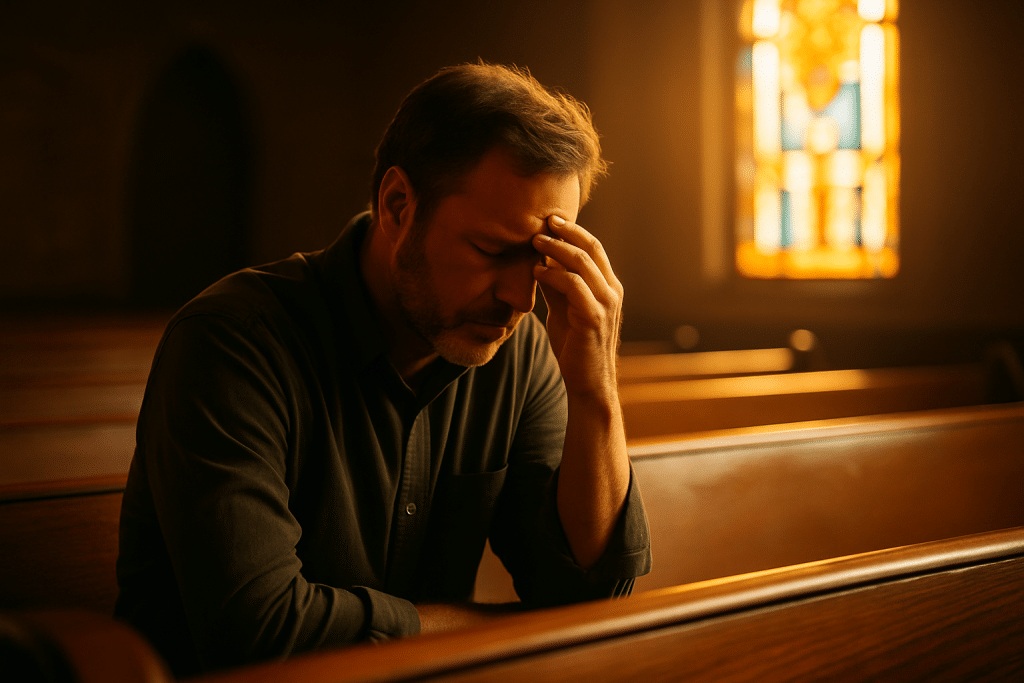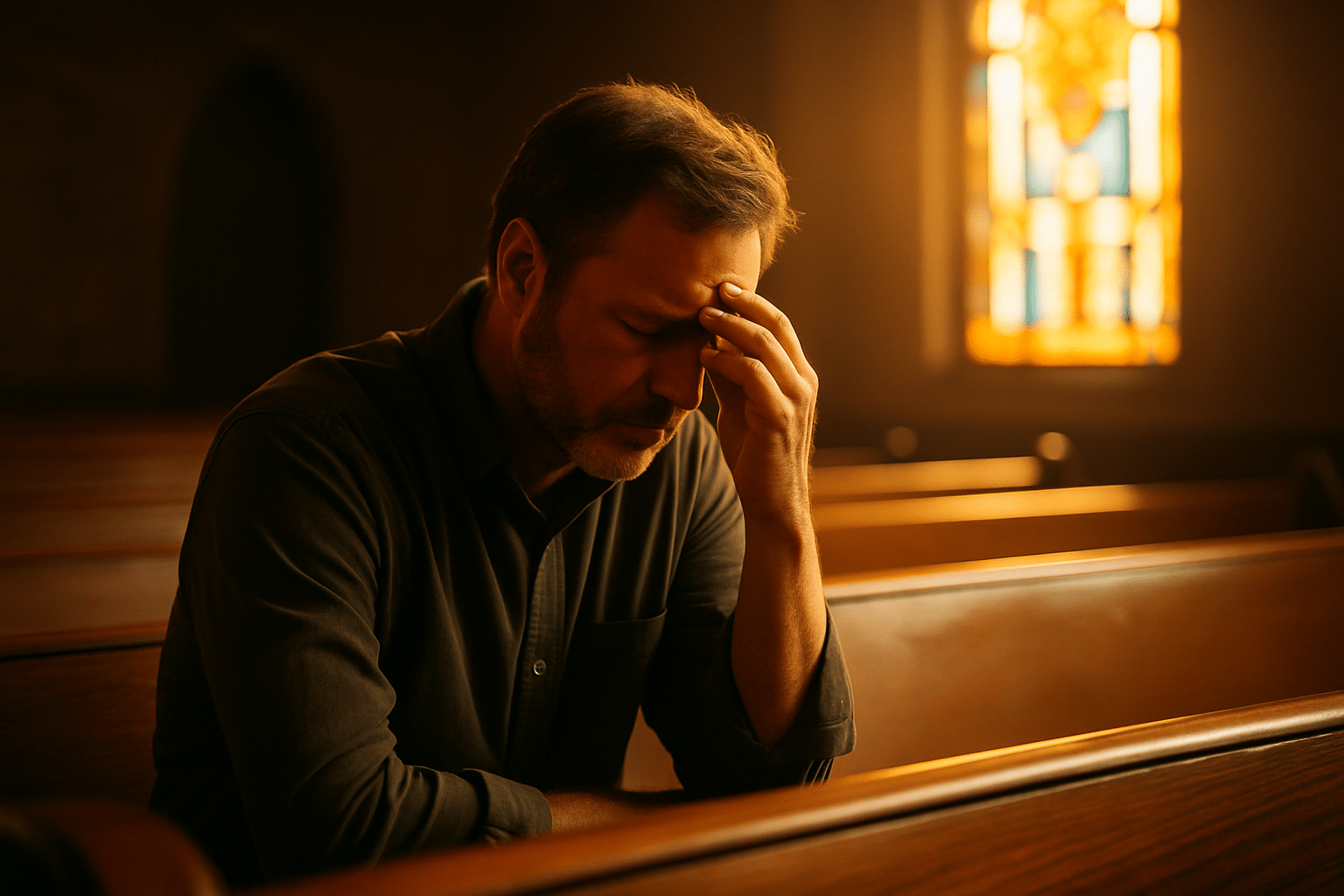Feeling Overwhelmed and Distant from God – Hope & Evidence
Estimated reading time: 8 minutes
A Hopeful Introduction
Feeling overwhelmed and distant from God can feel as though prayer bounces off the ceiling and life’s demands multiply faster than you can breathe. Yet the Bible shows this struggle is common. Elijah fled to the wilderness exhausted (1 Kings 19), David lamented God’s absence (Psalm 13), and even Jesus cried “My God, why have You forsaken Me?” (Matthew 27:46).
Accordingly, your ache does not disqualify you; rather, it places you in historic company. Meanwhile, neuroscience warns that chronic stress floods the brain with cortisol, narrows attention, and clips the wings of joy. Because the body, mind, and spirit interlock, a dysregulated nervous system can mute spiritual perception. However, the same integrated design means that practical steps—prayer, therapy, exercise—can reopen those channels.
This article distills findings from peer‑reviewed research, clinical guidelines, and centuries of Christian reflection to offer a roadmap out of spiritual dryness. We will trace common causes, review therapies that are both scientifically validated and biblically sound, suggest trustworthy resources, and close with a simple plan you can start today. As you read, keep repeating the promise, “The Lord is near to the broken‑hearted” (Psalm 34:18).
Your feelings may whisper distance, but His covenant love remains unbroken. Therefore, take heart: feeling overwhelmed and distant from God is a season, not a sentence, and, with wise action, the season can end. Throughout, we will highlight transition tools—small, repeatable habits—that tilt your physiology toward calm and your imagination toward hope, so that you can once again hear the gentle whisper of grace.
Tracing the Roots of Spiritual Dryness
Because we are whole persons, any sustained sense of spiritual distance usually rests on a three‑legged stool: biological strain, psychological patterns, and theological misperceptions. Biologically, sleepless nights, nutritional gaps, thyroid imbalances, or even excess caffeine push the autonomic nervous system into sympathetic overdrive. Heart rate climbs, breath shortens, and the brain’s limbic alarm centre shouts danger at every rustle. Consequently, reflective prayer becomes harder than sprinting uphill.
Psychological habits keep the cycle spinning. Catastrophic thoughts like “God has abandoned me” activate amygdala circuits that reinforce fear. World Health Organization data show that untreated anxiety affects more than 300 million people worldwide, yet effective care exists. Distorted theology whispers that good Christians never tremble; however, the gospel insists that weakness invites grace (2 Corinthians 12:9). Admitting the struggle opens space for help.
Accordingly, the first step toward relief is compassionate curiosity. Ask a trusted physician to run basic labs, keep a sleep log, and notice how media or sugar intake affects mood. At the same time, examine your devotional rhythms. Have grief, anger, or unconfessed sin built walls? Alternatively, are you simply in a God‑ordained wilderness season designed to deepen faith? Naming root factors prevents shotgun solutions and guides targeted healing. While the causes differ, they share a hopeful commonality: every one responds to practical intervention. In the next sections, we will outline those interventions so that feeling overwhelmed and distant from God no longer dictates your story.

Clinically and Scripturally Backed Therapies
Cognitive‑Behavioural Therapy (CBT) tops every modern guideline for anxiety disorders, and it harmonises beautifully with Romans 12:2, which calls believers to renew the mind. During CBT, you learn to identify automatic thoughts, test them against evidence, and replace lies with truth. One pilot study from Duke University showed that religiously‑integrated CBT produced remission rates equal to conventional CBT while increasing homework completion among Christians. Practically, you might write the fearful belief “I will fail and God will leave me” then counter with Philippians 4:13 and Hebrews 13:5. Because scriptural truth serves as the replacement thought, therapy becomes discipleship.
Additionally, mindfulness lowers blood pressure and calms the vagus nerve. Christians have practised a holy version for centuries—think lectio divina or breath prayer. Slowly inhale while praying, “Lord Jesus, have mercy,” and exhale, “I receive Your peace.” Studies in Religions confirm that such Christ‑centred mindfulness reduces anxiety scores and increases spiritual well‑being when feeling overwhelmed and distant from God. Medication is another gift. Selective Serotonin Re‑uptake Inhibitors correct neurotransmitter imbalance so that the rational prefrontal cortex can re‑engage. The American Academy of Family Physicians lists SSRIs as first‑line treatment, and GotQuestions.org clarifies that using medicine is not a lack of faith.
You can pray and take a pill, just like Paul advised Timothy to drink a little wine for his stomach. When combined with CBT and prayer, medication often provides the breathing room necessary to sense God again. Always consult your doctor, yet approach the option expectantly, not fearfully.
Lifestyle and Community Practices That Restore Joy
Beyond the clinic, everyday rhythms either inflame or quiet distress. Exercise ranks high. A twenty‑minute walk releases endorphins that rival mild antidepressants and, according to Harvard Health Publishing, also improves sleep. Moreover, Scripture affirms that physical training holds value (1 Timothy 4:8). Therefore, lace up shoes, step outside, and let creation preach hope. Likewise, nutrition matters. Stable blood sugar supports stable mood, so favour protein‑rich meals and limit caffeinated energy drinks that turbo‑charge jitters. Next, practice Sabbath. Elijah’s recovery began with a nap and a meal; your brain also needs margin.
Community is equally essential. Hebrews 10:25 urges believers not to forsake assembling, and modern studies link weekly church attendance with lower depression rates. When anxiety whispers isolation, reach out to a friend or small‑group leader. Invite them to pray Psalm 62:8 over you. Shared burden halves its weight. In addition, grounding techniques—such as naming five sensory details in the room—pull the racing mind back to present safety. You can learn these skills in our free guide on grounding techniques for anxiety and pair them with a favourite Bible verse. Furthermore, deep‑breathing practices, catalogued here, activate the parasympathetic system, signalling to the body that it is safe to rest.
Whenever you catch yourself feeling overwhelmed and distant from God, stand up, stretch, and quote Isaiah 41:10 to remind your heart of divine support. If panic surges, review the Panic‑Attack Relief Guide or skim our article on how to stop overthinking for quick biblical prompts. Together, these practices train the nervous system to stay calm so that your spirit can listen. Soon, feeling overwhelmed and distant from God will give way to renewed connection.

Trusted Resources and Practical Recommendations When Feeling Overwhelmed And Distant From God
If you have wondered what to do next, the following resources bundle biblical conviction with clinical rigour. First, the YouVersion Bible App now offers an Anxiety reading plan that inserts short devotions and breathing cues into your phone’s lock‑screen. Second, the Christian meditation app Abide streams guided sleep stories grounded in Scripture; an eight‑week trial reduced nightly wake‑ups in a small case series. Third, the book Christ‑Centered Mindfulness by Timbers and Hollenberger weaves peer‑reviewed findings with ancient disciplines. Each resource is inexpensive, evidence‑based, and designed for laypeople.
Additionally, consider keeping a gratitude journal. A randomised trial highlighted by Harvard Health Publishing reported that adults who listed three blessings daily experienced a 25 percent jump in happiness after ten weeks. You can start with a simple notebook, yet many enjoy the structured prompts inside the Prayer for Anxiety Journal. For professional help, directories such as the Christian Counseling & Educational Foundation and Focus on the Family’s therapist locator allow you to filter for licensed providers who respect biblical authority.
Finally, a wearable such as the Philips Smartease vibrating breath‑coach gently reminds you to inhale slowly during tense meetings, translating spiritual practice into muscle memory. Before purchasing, pray for discernment, read reviews, and consult your healthcare team. Nevertheless, small, strategic tools often accelerate healing, and they testify that God can use modern craftsmanship to serve His children. Each item was selected because it speaks directly to readers who are feeling overwhelmed and distant from God and craving clear next steps. Taken together, these recommendations form a personalised kit for regaining peace and presence.
Conclusion and Next Steps For Spiritual Dryness
In summary, the valley of feeling overwhelmed and distant from God is real, yet it is traversable. By addressing biological stress, renewing thought patterns, nurturing community, and embracing appropriate medicine, you cooperate with God’s multi‑layered design for healing. Importantly, progress seldom occurs in a straight line. You may enjoy two calm days, then face a setback. Nevertheless, Galatians 6:9 assures us that perseverance bears fruit. Keep recording victories, however small. Over time, your testimony will echo Psalm 94:19: “When anxiety was great within me, Your consolation brought me joy.”
Therefore, take the next practical step today. Download our full research brief for printable checklists, scripture cards, and a seven‑day habit tracker. Tape the cards to your mirror, share the tracker with a friend, and watch momentum build. As you move, ask the Holy Spirit to breathe life into every action. He is the Helper (John 14:26) who empowers both prayer and practice.
Finally, speak aloud this blessing: “The Lord bless you and keep you; the Lord make His face shine on you and be gracious to you” (Numbers 6:24‑25). Truth spoken becomes truth felt. May His face, which never turned away, become vivid again. And may your journey equip you to comfort others who whisper, in quiet despair, that same confession: they are feeling overwhelmed and distant from God. Your renewed hope will prove that our compassionate Shepherd still leaves the ninety‑nine to find one uneasy lamb. Click below, and let the healing adventure begin with faith, courage, and science combined.







